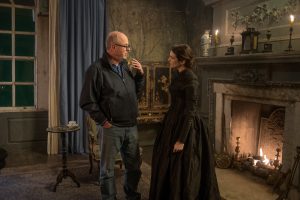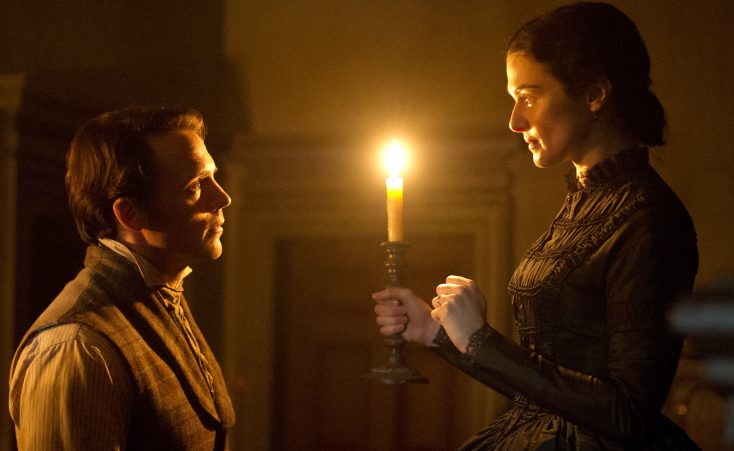
(l-r) Director Roger Michell and Rachel Weisz as “Rachel Ashley” on the set of MY COUSIN RACHEL. ©20th Century Fox. CR: Nicola Dove.
By ANGELA DAWSON
Front Row Features
Filmmaker Roger Michell, who brought romance to the big screen with popular and critical hits like “Notting Hill” and “Venus,” offers a diversion from the plethora of bloated, effects-laden fantasy summer movies with the compelling 19th century sexually-charged suspense thriller “My Cousin Rachel.”
Based on the book by mid-20th century author Daphne du Maurier, whose works were go-to source material for Alfred Hitchcock (“Rebecca,” “Jamaica Inn,” “The Birds”), the drama centers on a mysterious part-Italian widow who may (or may not) have contributed to her rich English husband’s death. Initially reviled by her husband’s young cousin, who is set to inherit the dead man’s property, she surprises him when she appears to be uninterested in staking a claim to his estate. In addition to that, she turns out to be quite charming and overwhelmingly attractive to the young man when they finally do meet. Ashamed that he ever thought ill of her, young Philip decides to sign over the entire estate to her as soon as he is of age (25), despite his guardian’s and others’ urging to be cautious of this mysterious foreigner. When he becomes deathly ill, Philip’s initial doubts about Rachel resurface. Michell’s adaptation of du Maurier’s work leaves it up to the audience to decide her guilt or innocence for themselves.
The film stars Oscar winner Rachel Weisz (“The Constant Gardener”), Sam Claflin (“Pirates of the Caribbean: On Stranger Tides”), Iain Glen (“Game of Thrones”) and Holliday Grainger (“Cinderella”).
In a phone interview from the U.K., Michell spoke about adapting the du Maurier work for the screen, casting the film and maintaining the moral ambiguity of the title character.
Q: Your movie is unique this summer in that it has no grand visual effects.
Michell: It’s an alternative for people who want something a little bit different.
Q: What made you want to write the adaptation and direct “My Cousin Rachel?” Were you familiar with the 1952 film starring Olivia de Havilland and Richard Burton?
Michell: I hadn’t seen the previous film. I decided it would be better not to watch the previous film. I was simply, by chance, reading an old paperback copy of the book, which I found one night on my shelf, which I think it belonged to my mother. I knew really nothing about the book. I didn’t know a lot about Daphne du Maurier but I thought it would be sort of a romantic, bodice-ripper, chick-lit from the ‘50s. But it was so much more interesting and so much more complicated and full of weirdness and oddness and darkness. I found it compelling and by the time I was halfway through the book, I wanted to make a film of it.
Q: This is your first feature film screenwriting credit. Why did you want to write this one yourself?
Michell: I just felt I knew how to do it and I felt if I got another writer onboard, I’d simply sit there asking him to do it the way I wanted to do it, so why not cut out the middleman and have all the fun in adapting it myself.
Q: As the son of a diplomat, you spent a lot of your youth moving from one country to another and being the new kid at school. Do you think that’s why this story about this woman, who’s a mysterious outsider, appealed to you?
Michell: I guess. Who knows what our childhood experiences that are in us will define us for the rest of our lives? That could be possible. I’ve always felt that my life as a kid having to move all the time gave me a sense of curiosity and an interest in emotional tourism, if you like. Directing is a kind of super-privileged tourism. You get a passport to go into strange worlds and examine strange relationships. You’re sitting in the corner watching people saying odd things to each other in a privileged and remarkable way. And there’s something in this story that made me want to do that. It made me want to sit in the corner and eavesdrop on this odd story.
Q: The success of the film hinges on having the right “Rachel” for this film. How did you happen to cast Rachel Weisz in that role?
Michell: I knew her but I’d never worked with her before. I’ve seen lots of her film work. I’d also seen Rachel working on stage in London, so I had complete confidence in her ability as an actor. She’s a really proper, serious actor. She also has this odd, Mona Lisa-like quality. If you block out the lower half of the face, she seems to be saying one thing with her expression, and if you block out the top half of the face, she seems to be saying something quite different. I think Rachel has this wonderful ambiguity, or the potential for ambiguity, which is endlessly fascinating. Plus, she’s physically perfect for the part. She’s got these penetrating dark eyes. She’s the right age for the part. She was really perfect.
Q: And you had to match her up with the right “Philip,” a younger man who’s not a boy.
Michell: He had to be halfway poised between being a colt and being a man. He’s a man but there’s still something coltish about him. There’s something rash and undeveloped about him. There’s something impetuous about him. There’s something stunted about him. He’s been brought up in a house that has conspicuously been without a female presence. He’s been brought up by a cousin who kind of a misogynist until he went off to Italy and met Rachel so there’s something ungrown about Philip. He’s full of life and confidence and hope and charm but there’s something not quite right. I think that’s an important component to the obsession that he starts to develop toward his cousin. Sam (Claflin) has all those bits to his acting. He’s a wonderfully vigorous, handsome, skillful actor but he’s still young. He’s still a youngster. There’s a gawky grace about him, an innocence and a gullibility about him, which is very winning and also makes him very vulnerable, particularly in this situation with this sexy, glamorous, much-older woman. It’s kind of like “The Graduate” in a way. It’s like other films that are about sex, which is transgressive and something about its wrongness that makes it even more erotic. Because, in a way, he’s having an affair with his mother.
It’s that odd duality of that relationship running parallel to this pretty steamy sexual relationship, which I found pretty gripping and interesting.
Q: You mentioned that she seems like a contemporary woman who’s been dropped into that period 200 years ago.
Michell: That’s partly what du Maurier was doing in 1950 when she wrote the book. It’s just after the world of Jane Austen but not that long after. I did a film called “Persuasion” set in 1814. This is set around 1830 although, interestingly, (du Maurier) never states in the book when the book is set. But you can tell it’s before the railways have linked to the west country. If there was rail travel, then the book would have a completely different speed. The plot would have to be worked in a different way. This was a time where everything had to be conveyed by letter, and sometimes those letters would arrive months, sometimes years, after they’d been written. It was a time when it took at least three weeks to get from England to Florence.
I thought that was interesting that she picked this sort of Jane Austen world, and we know what that world is like: the sex is so buried that it’s almost impossible to detect a pulse. Whereas this is a story where the sex is on the front foot from the moment (Rachel) arrives. She tells a story about Great Aunt Phoebe dying of shock on her wedding night in a way that could only have one explanation. I thought that was really intriguing for du Maurier to write this. It’s a choice, a mismatch that I try to push in the film.
Q: You received the blessing of du Maurier’s granddaughter. Did she come to set?
Michell: She did, yeah. She came to principal set. In fact, du Maurier’s son also has seen the film and has been very kind and encouraging about it. He told me that (his mother) wasn’t a fan of the original film. She wasn’t quite sure Olivia de Havilland was really perfect casting (for Rachel). So I hoped that du Maurier would approve of our version.
Q: You cast Rachel McAdams in your romantic comedy “Morning Glory.” Rachel Weisz in “My Cousin Rachel.” What gives?
Michell: (quips) I’m going to do a remake of “The Rachel Papers” next. Anything with a Rachel in it, I’ll do.
Q: Even though this is a historic piece, this film remains relevant today in terms of people’s fears of outsiders.
Michell: Certainly people in the world of this story buy into a series of stereotypes of Italians. They’re hot-blooded. They’re sensual, They’re keen to fight duels. They’re only interested in having sex with each other. That’s very much a cloud of obscurity that surrounds Rachel before she appears. I wouldn’t take it a lot further than that.
Q: Can you talk about casting Iain Glen, who plays Philip’s guardian? Had you worked with him previously?
Michell: No, but I’ve known him for years as well. He’s really a consummate actor. I’ve seen him in lots of great things and (the roles) are always quite different. He’s a proper character actor; he’s really transformative. He’s sort of a benign moral compass in this film in that he’s not unforgiving and he doesn’t bear grudges. He tries to see the best in everybody. But I think he’s very taken with Rachel at the beginning himself. He’s had secret fantasies about whether he should marry Rachel. There’s the moment in the film where Philip asks him if he’s thought about marrying her and he can’t answer (the question) because he clearly has. But then, you watch him as someone who’s watched this kid grow up and he’s looked after sign away everything, every stick of furniture, every brick, every blade of grass on the estate to this woman in a way that’s clearly obsessive and rash, and yet he sort of sadly supports that and still turns up that night to drink to (Philip’s) health and wish him a happy birthday.
Q: You left it up to the viewer to determine whether Rachel is guilty or not of poisoning Philip.
Michell: I don’t know either, and I don’t want to know. Even if I did know, I wouldn’t say what I knew. I think that’s the charm and fascination with the film. You just don’t know. We all have bits in life like that, don’t we? It’s intriguing forever because we can never figure out what was going on.
Q: What would you like to do next?
Michell: There are a few things I’m kicking around but nothing is in stone yet. I’ve just done a play at the National Theatre here, which was really absorbing and fun to do. I’m now reading and thinking and wandering around, walking my dog and kicking my children and deciding what I’m going to do next.





